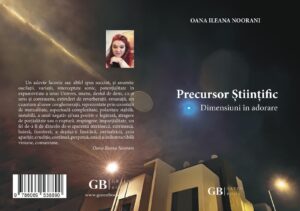


Oana Ileana Noorani
💕Din ciclul: Introspecții în iubirea💕 științifică…
Îți mai amintești iubite, când te-am întrebat: De ce ai mereu un alt chip, de ce cu fiecare clipă trecută te preschimbi sub o altă înfățișare mobilă a unui cadru în mișcare? În care apari mereu și mereu cu o nouă sau veche privire, o expresie facială succedată de o alta, o stare care angrenează mai multe stări tranzitorii înglobate într-un întreg formatat din simțiri dăinuitoare sau trecătoare în apariție. Tot timpul diferit și tot timpul același! Ți-am dovedit că te iubesc într-o asemenea măsură încât măsurătoarea momentelor încadrate în procesul iubirii, nu poate fi relevată decât la modul cât mai primar posibil, dar poate fi trăită sub forma altor parametri, aceia ai conectării conștiințelor noastre. Și atunci, oare ce înseamnă măsurătoarea timpului? Privesc ceasul, după cum aș privi un metru și îmi oferă o panoramă a înaintării graduale, și totuși intuiesc un paradox al unui înapoi la fel de gradual cum s-a făcut înaintarea. Da, se poate să te fi iubit cu câțiva ani în urmă și se prea poate să te mai iubesc încă un mileniu pentru eternitatea clipei sau o clipă pentru eternitatea mileniului. Să fi trecut timpul? Să ne fi deplasat într-o direcție a înaintării? Timpul nu este liniar, nu se prezintă nici măcar circular, este o congruență de aspecte pe care dacă ar trebui să le încadrăm într-o poziționare nu am avea posibilitatea, pentru că poziționarea timpului ar fi un cuantum al schimbărilor apărute imediat în spațiu. Einstein spune: „Pune mâna pe o sobă fierbinte un minut și ți se va părea o oră. Stai cu o fată frumoasă o oră și ți se va părea un minut. Aceasta este relativitatea.” Întrebarea apare sub o formă destul de concisă: Care va fi percepția timpului fără a privi o formă de măsurare, înainte sau înapoi? Statică sau în mișcare? Toate aceste relativități ale timpului, se numesc manifestări ale timpului în materie, percepute în funcție de evenimente prin intermediul trăirilor, mai vechi sau mai noi, întorcându-ne la momentul de bază sau înaintând cât mai departe de structura lui. Într-o manieră asemănătoare cu a unei stări în brațele tale iubitul meu, în care îmi apari uneori întârziat, uneori devreme; o stare pe care o simt ca și cum ar fi fost ieri și totuși va veni și mâine.

💕From the series: Introspections in Scientific Love…💕
Do you remember, my love, when I asked you: Why do you always have a different face, why with every passing moment do you transform under a different mobile appearance of a moving frame? In which you appear again and again with a new or old gaze, a facial expression followed by another, a state that engages multiple transitional states embedded in a whole structured of enduring or fleeting perceptions. Always different and yet always the same! I have proven to you that I love you to such an extent that measuring the moments framed in the process of love can only be revealed in the most primary way possible, but it can be experienced in the form of other parameters, those of connecting our consciousnesses. And then, what does measuring time mean? I look at the clock, as I would look at a ruler, and it offers me a panorama of gradual advancement, and yet I sense a paradox of a retreat as gradual as the advancement was made. Yes, it’s possible that I loved you a few years ago and it’s quite possible that I will love you for another millennium for the eternity of the moment or a moment for the eternity of the millennium. Has time passed? Have we moved in a direction of advancement? Time is not linear, it is not even circular, it is a congruence of aspects that if we had to frame in a position, we would not have the possibility, because the positioning of time would be a quantum of changes that appear immediately in space. Einstein says, “Put your hand on a hot stove for a minute, and it seems like an hour. Sit with a pretty girl for an hour, and it seems like a minute. That’s relativity.” The question arises in quite a concise form: What will be the perception of time without looking at a form of measurement, backward or forward? Static or moving? All these relativities of time are called manifestations of time in matter, perceived in terms of events through experiences, older or newer, returning to the basic moment or moving as far from its structure as possible. In a manner similar to being in your arms, my love, in which you sometimes appear belated, sometimes early; a state that I feel as if it was yesterday and yet will also come tomorrow.


Translated from Romanian into English by Adriana Crăciun.

Published by: Md. Sadiqur Rahman Rumen
Editor in chief: Pencraft, Literary Magazine Bangladesh